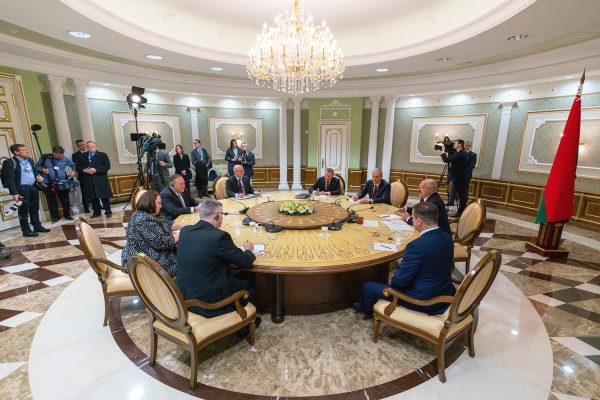
Belarus’ Alexander Lukashenko has been in power for 26 years. He is expected to win what will likely be a rigged election on Sunday, but he may not get a landslide this time. The cracks in his regime are widening.
Political repression
President since the office was created in 1994, Lukashenko has recently clamped down on dissent. Two of his main political rivals have been arrested. A third is in exile. Viktor Babariko, a former banker, was barred from running because his campaign was allegedly supported by foreign entities. Valery Tsepkalo, an IT entrepreneur, was similarly denied registration by the electoral commission.
A robust challenger has emerged in the form Svetlana Tikhanovskaya, the wife of one of the imprisoned opposition leaders. Her goal is to free the political prisoners and restore Belarus’ pre-1996 constitution, which had a weaker presidency.
Twin crises
Contributing to Tikhanovskaya’s popularity is Lukashenko’s handling of COVID-19.
Lukashenko downplayed the danger of coronavirus and refused to impose a lockdown. Over 68,000 Belarusians are known to have been infected. In neighboring Poland, with four times the population, fewer than 50,000 cases have been reported.
Keeping Belarus’ economy open has little effect when it is so heavily dependent on Russia’s, which is in recession.
Belarus exports 41 percent, and imports 56 percent, of its goods from Russia. 31 percent of its foreign investments come from Moscow.
Exports have shrunk 19 percent year on year between January and April. The Belarusian economy is still smaller than it was in 2008, before the last crisis. Wages, which grew in the early years of Lukashenko’s presidency, are stagnant.
Russia’s role
Cracks have emerged in what used to be a tight relationship. For years, Belarus enjoyed cheap hydrocarbon imports, which it could resell at a premium. Now Russia is looking to end its export duties on crude oil, meaning Belarus would have to pay higher prices, which would almost certainly end its lucrative reselling business. Lukashenko has threatened to look to the West for energy.
Some have suggested this tax shift reflects Moscow’s desire to gain a return on its “investments” in Belarus through economic, military and political integration: the proposed Union State. Lukashenko once supported the idea when there was a chance he might serve as president of a united Belarus-Russia. But if it’s just another step toward Vladimir Putin’s goal of reversing the collapse of the Soviet Union, the Belarusian isn’t interested.
Crimea 2.0?
Other analysts believe Russia might take advantage of the unrest in Belarus and absorb it. A Crimea 2.0.
This still seems far-fetched.
Unlike Crimea, which is predominantly Russian, Belarus is home to Belarusians. Crimea holds a strong historical significance to Russia. The economic and strategic benefits of the Black Sea peninsula far outweigh Belarus’. If Putin’s goal is to stabilize the Russian economy and enhance living standards, which have barely improved for ordinary Russians in recent years, another foreign-policy adventure would be counterproductive.
Besides, why annex Belarus when it is economically dependent on Russia, shares many Russian political and social values, and has nowhere else to go? America and Europe would be happy to see Lukashenko voted out, but a Ukraine-style scenario, where a pro-Western government leads the country into an association treaty with the EU, is still a long way off for Belarus.
